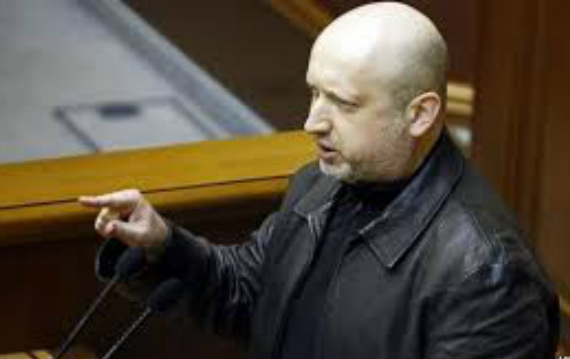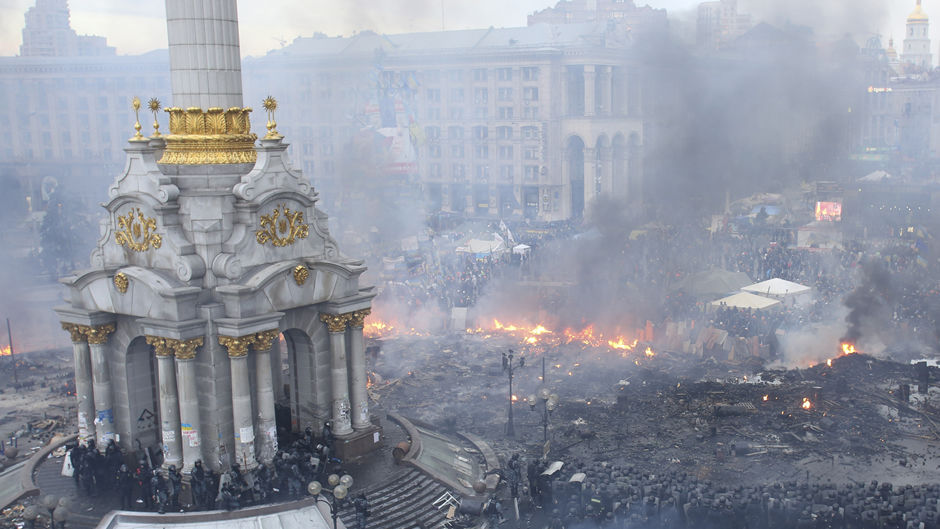Revolution in Ukraine and the threat to the West
Ukraine has a new interim president. Viktor Yanukovych has left Kiev. The opposition leader Yuliya Tymoshenko has been freed. Politicians have been given two days to form a government in the national interest. Presidential elections have been called for May.
What does all this mean? Is it a recipe for stability - or disaster? And does it matter to the rest of the world? Tony Halpin, former Moscow correspondent of the Times, writes exclusively for SubScribe on why the events of the past week could lead to the splintering of the country and pose the most serious security challenge to the West for 20 years.
What does all this mean? Is it a recipe for stability - or disaster? And does it matter to the rest of the world? Tony Halpin, former Moscow correspondent of the Times, writes exclusively for SubScribe on why the events of the past week could lead to the splintering of the country and pose the most serious security challenge to the West for 20 years.
The revolution in Ukraine threatens to become the most serious security challenge to the West since the collapse of Yugoslavia in the 1990s. Foreign Secretary William Hague’s warning to Russia on Sunday not to intervene in the crisis was a clear sign that Europe and the United States are nervous about President Vladimir Putin’s intentions.
Amid the drama and euphoria on Kiev’s Independence Square - or Maidan - there are real risks that the Kremlin will encourage a splintering of the country rather than allow Ukraine to escape Russia’s sphere of influence. After pressuring President Viktor Yanukovych to reject the association agreement in its tug-of-war with the EU in November, Moscow thought that it had won the battle for Ukraine. Yanukovych may have proven to be a loser, but the Kremlin still has no intention of losing Ukraine.
In Russian-speaking Crimea, in the south, and the country's second largest city Kharkiv, in the east, officials have already declared their refusal to accept the new authorities in Kiev. A congress of regional bosses in Kharkiv was observed by two senior Russian politicians - Alexei Pushkov and Mikhail Margelov - when it passed a declaration to that effect. Margelov said later that the meeting showed “that the Maidan and the opposition, let alone the militants, are not the majority of the Ukrainian people”.
The risks of secession and annexation are particularly acute in Crimea, the only region of Ukraine with an ethnic Russian majority. Pictures have already emerged on social media of crowds attacking pro-Maidan demonstrators and of hundreds of men lining up in the regional capital Simferopol to join paramilitary brigades to defend Crimea.
Public opinion locally has been strongly influenced by Russian state television, widely watched in the south and east, which has relentlessly portrayed the protesters in Kiev as controlled by extremists and fascists, driven by hatred of Russians and Jews, and acting out a plan devised in Washington and Brussels to weaken Russia and leave her vulnerable to attack.
Amid the drama and euphoria on Kiev’s Independence Square - or Maidan - there are real risks that the Kremlin will encourage a splintering of the country rather than allow Ukraine to escape Russia’s sphere of influence. After pressuring President Viktor Yanukovych to reject the association agreement in its tug-of-war with the EU in November, Moscow thought that it had won the battle for Ukraine. Yanukovych may have proven to be a loser, but the Kremlin still has no intention of losing Ukraine.
In Russian-speaking Crimea, in the south, and the country's second largest city Kharkiv, in the east, officials have already declared their refusal to accept the new authorities in Kiev. A congress of regional bosses in Kharkiv was observed by two senior Russian politicians - Alexei Pushkov and Mikhail Margelov - when it passed a declaration to that effect. Margelov said later that the meeting showed “that the Maidan and the opposition, let alone the militants, are not the majority of the Ukrainian people”.
The risks of secession and annexation are particularly acute in Crimea, the only region of Ukraine with an ethnic Russian majority. Pictures have already emerged on social media of crowds attacking pro-Maidan demonstrators and of hundreds of men lining up in the regional capital Simferopol to join paramilitary brigades to defend Crimea.
Public opinion locally has been strongly influenced by Russian state television, widely watched in the south and east, which has relentlessly portrayed the protesters in Kiev as controlled by extremists and fascists, driven by hatred of Russians and Jews, and acting out a plan devised in Washington and Brussels to weaken Russia and leave her vulnerable to attack.
|
Crimea is of critical strategic importance to the Kremlin because the port of Sevastopol is home to Russia’s Black Sea Fleet, the only warm-water naval base that Russia has access to. This week marked the 60th anniversary of the Soviet authorities' decision to transfer Crimea from the Russian republic to the Ukrainian republic.
Many senior Kremlin officials, and many Russians generally, do not accept that Crimea is a part of Ukraine today and continue to regard it as Russian territory that should one day be reunited with the Motherland. |
|
Ukraine’s former president Viktor Yushchenko, who swept to power in the pro-western Orange revolution of 2004, served notice on Russia that it would have to quit the base when a lease agreed after the Soviet collapse expired in 2017. During Russia’s war with Georgia in 2008, Kiev and Moscow came close to military confrontation after Yushchenko signed an order imposing restrictions on the movement of the Black Sea Fleet in solidarity with Tbilisi.
Two Russian diplomats were later expelled after Ukraine’s security services caught them distributing hundreds of thousands of dollars to pro-Russian groups in Crimea and attempting to recruit local officials as informants, in an apparent attempt to stir up discontent with Yushchenko’s regime.
One of the first things the pro-Russian Yanukoyvch did when he became president in 2010 was to agree a deal with Moscow to extend the lease by 25 years to 2042 in return for a discount on gas prices. Now that he has been removed from office, Moscow fears that a nationalist government may once again insist on forcing Russia out of Crimea. With central authority in Kiev weakened, the opportunity to stir up secessionism and justify an intervention to “protect” Russians in Crimea may prove hard to resist.
Two Russian diplomats were later expelled after Ukraine’s security services caught them distributing hundreds of thousands of dollars to pro-Russian groups in Crimea and attempting to recruit local officials as informants, in an apparent attempt to stir up discontent with Yushchenko’s regime.
One of the first things the pro-Russian Yanukoyvch did when he became president in 2010 was to agree a deal with Moscow to extend the lease by 25 years to 2042 in return for a discount on gas prices. Now that he has been removed from office, Moscow fears that a nationalist government may once again insist on forcing Russia out of Crimea. With central authority in Kiev weakened, the opportunity to stir up secessionism and justify an intervention to “protect” Russians in Crimea may prove hard to resist.
|
|
Putin used this formula successfully in Georgia to change internationally recognised borders and defy pressure from Europe and the US to withdraw. Abkhazia and South Ossetia, which were the focus of the 2008 war, remain under Russian control with large military garrisons even though the rest of the world recognises them as part of Georgia. Moscow sent troops into Abkhazia and South Ossetia to “protect” Russian citizens from Georgian forces, having handed out passports like confetti to local residents in previous years, then recognised the territories as sovereign states and signed cooperation agreements with them.
A similar scenario in Crimea would play out with far more serious consequences, given the huge size of Ukraine and the already tense relationships between nationalists and Russian sympathisers. The simplistic division between a pro-European west and pro-Russian east does not reflect the complexity of Ukraine’s ethnic geography. An attempt at secession and an appeal for Russian protection could easily plunge the country into a bitter war that spread far beyond Crimea. Nor could Britain sit on the sidelines as it did during the Georgian conflict. It is a signatory with Russia and the US to the 1994 Budapest Memorandum, which provided security assurances to Ukraine in return for surrendering its portion of the former Soviet nuclear arsenal. The agreement offered support if Ukraine became the victim of threatened aggression that involved the use of nuclear weapons. But it also affirmed a commitment by the US, Russia and Britain to “respect the Independence and Sovereignty and the existing borders of Ukraine”. A change now to Ukraine’s borders with Russian support or participation would present a direct challenge to the Budapest Memorandum and the value of British and US commitments to its sovereignty. The crisis in Georgia, which brought Western relations with Russia almost to breaking point, would appear as small fry by comparison with Ukraine. Putin has shown his determination, however, not to cede ground in what he considers Russia’s sphere of influence. One by one, he has sought to sabotage the EU’s efforts to agree association agreements with former Soviet republics through its Eastern Partnership programme. Armenia was first to succumb, abandoning its deal with Brussels in favour of joining Putin’s Customs Union in return for cheap gas. Georgia and Moldova did sign, but Moscow knows it can make life miserable for both through its leverage in Abkhazia and South Ossetia as well as in Moldova’s separatist enclave of Transdniestr. But Ukraine remains the big prize. It is bad enough for Putin that ordinary Russians could see how Ukrainians took to the streets and faced down the riot police to overthrow an authoritarian president. Yanukovych’s weakness, in Moscow’s eyes, in not putting down the protests more forcefully caused plan A to fail. |
If “soft power” inducements, in the form of cheap gas and a $15 billion loan from Russia, failed to secure Ukraine, then the Kremlin may adopt a tougher approach to destabilise the new regime and retain influence.
The stakes are very high in this country of 46 million people. The US and Europe may have welcomed Kiev’s revolution, but Ukraine was already teetering on the verge of bankruptcy before this crisis and needs $15 billion to pay back debts this year alone. It now faces months of political uncertainty. Putin has demonstrated his willingness to play rough to secure his objectives. Washington and Brussels have shown little sign so far that they have the political and financial will to deter him from doing so in Ukraine.
The stakes are very high in this country of 46 million people. The US and Europe may have welcomed Kiev’s revolution, but Ukraine was already teetering on the verge of bankruptcy before this crisis and needs $15 billion to pay back debts this year alone. It now faces months of political uncertainty. Putin has demonstrated his willingness to play rough to secure his objectives. Washington and Brussels have shown little sign so far that they have the political and financial will to deter him from doing so in Ukraine.
|
©Tony Halpin, 2014
If you have firsthand knowledge or experience of any issue that is the subject of press coverage, please use the contact form here to get in touch. SubScribe is happy to welcome contributions from anyone who knows what they are talking about. |
Keep up to date with SubScribeSubScribe is not intended as a live news site, but it aims to offer thoughts on the industry, links to key industry players and commentary on what they are up to.
If you would like weekly updates (promise we won't bombard you with emails) please sign up below.
|






